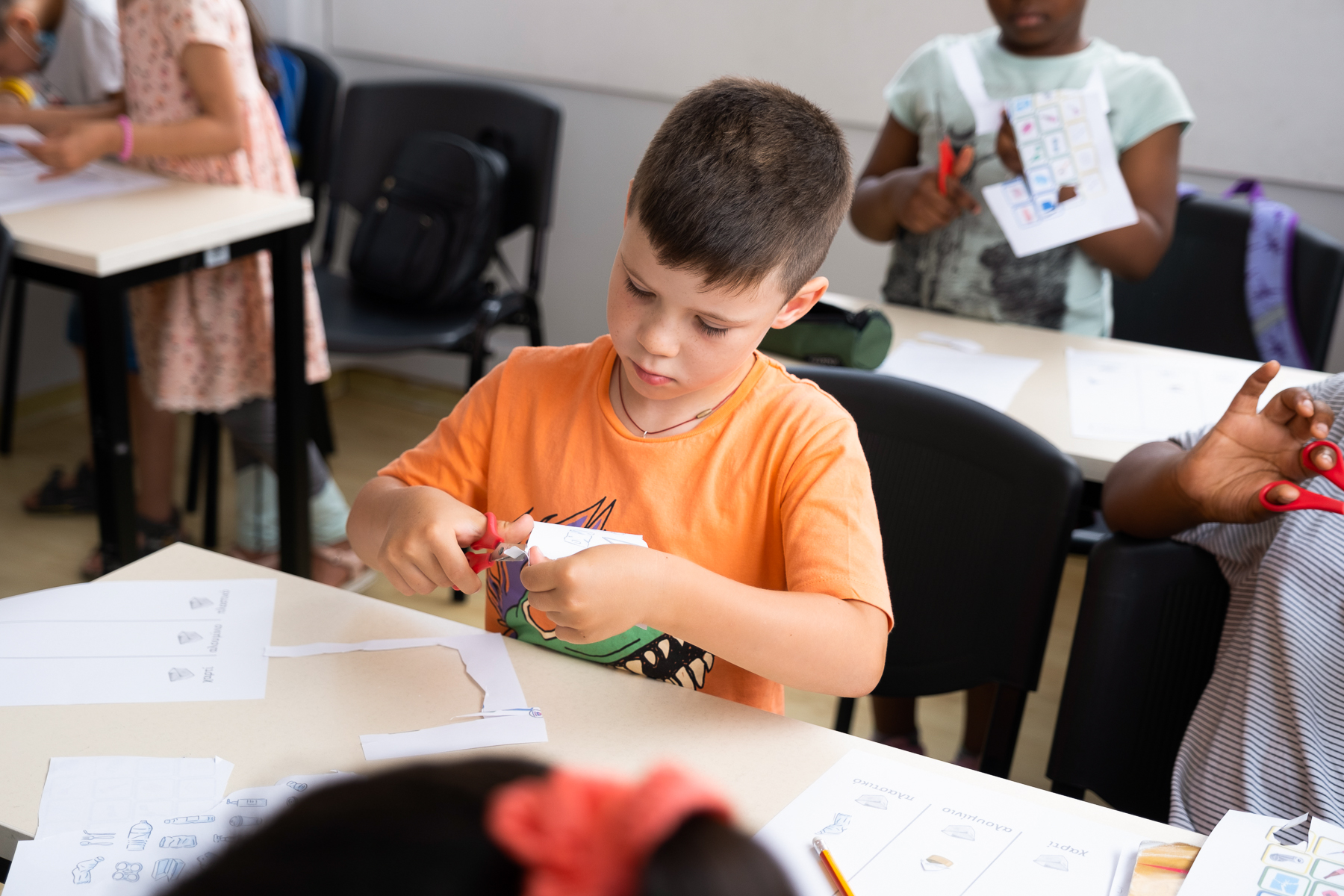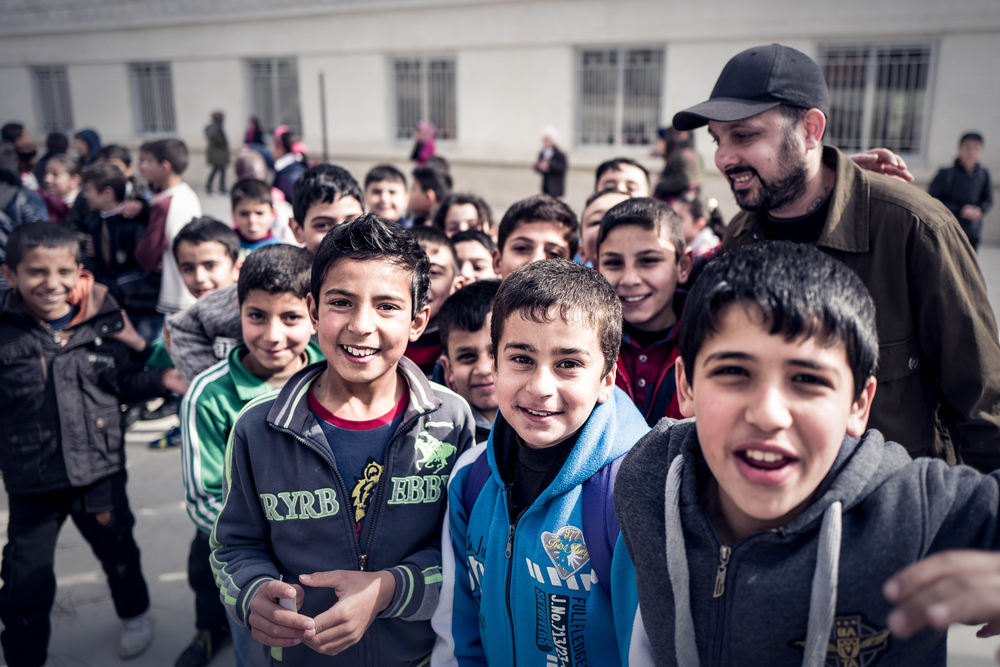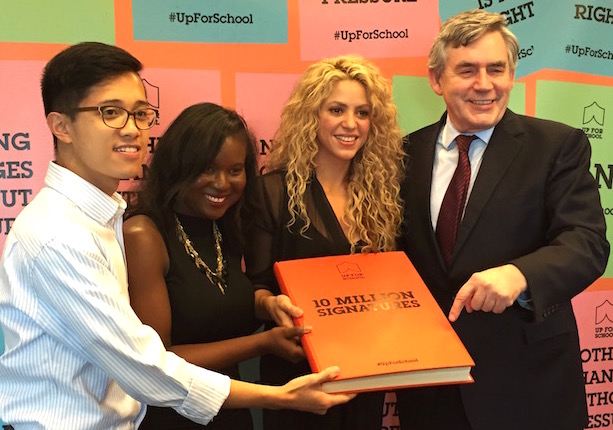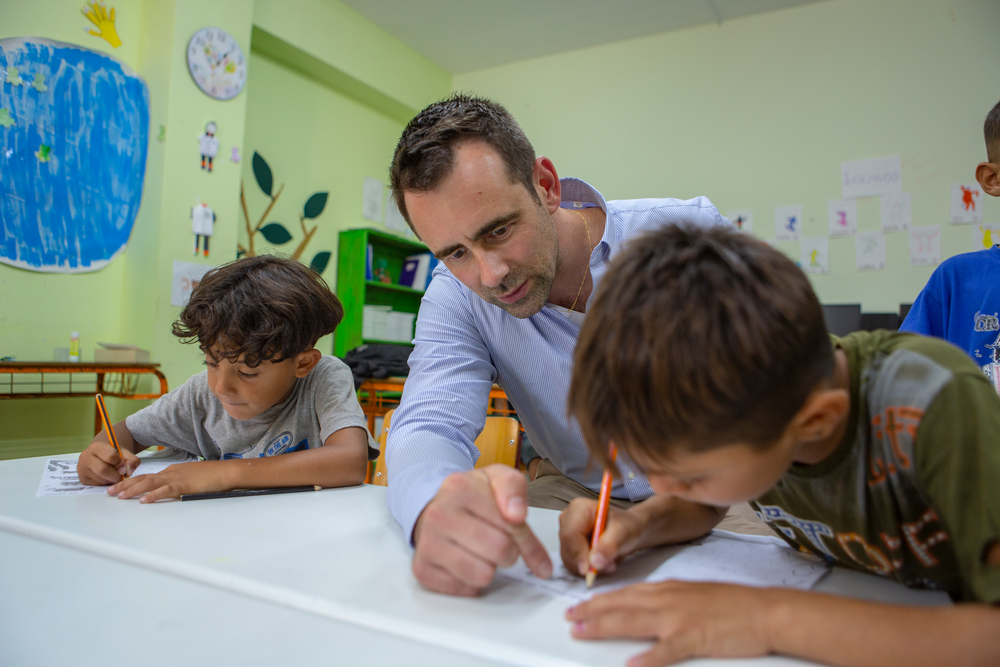Theirworld’s mission to give children in crises a safe place to learn

Children in conflicts, Education in emergencies, Global Youth Ambassadors, Refugees and internally displaced people, Safe schools
As part of our 20th anniversary, we are taking a series of in-depth looks at key areas of our work - today we focus on the need for action, advocacy and planning in emergencies.
When Malala Yousafzai gave her famous speech at the United Nations in 2013, it made headlines around the world. Weeks later, but with much less fanfare, a report was published that led to hundreds of thousands of Syrian refugee children going to school.
Both are key moments in the story of Theirworld and our mission to ensure every child has a safe place to learn. They laid the path for other breakthroughs, including:
- The record-breaking 11 million-signature #UpForSchool Petition
- The Education Cannot Wait global fund for education in emergencies
- Our work in refugee crisis countries such as Lebanon and Greece, which continues today
Almost a decade later, education has moved up the global agenda when it comes to responding to humanitarian emergencies such as conflicts, disasters and health crises, including the Covid-19 pandemic.
World leaders and donors now realise that safe schools are crucial in helping displaced young people deal with trauma and uncertainty. As well as education, schools give children structure, physical and emotional security, and hope.

Oleksandr, a young refugee from Ukraine, at at a non-formal education centre in Greece (Theirworld/Vasia Anagnostopolou)
Children like seven-year-old Oleksandr, who fled the war in Ukraine with his mother Tetyana. He now lives at a refugee camp in Athens, where he goes to classes thanks to a plan devised by Theirworld.
Tetyana said: “The school here helps him to become more sociable, not to be afraid. It is not just about education. It is about being in society.”
Back to the beginning
Theirworld’s role in the seismic shift in attitudes towards education aid began in 2013, when we launched a youth-led movement called A World at School, along with our Global Youth Ambassador programme.
This led to the first-ever Youth Takeover of the UN and Malala’s memorable “one pen and one book can change the world” speech, watched by more than 500 youth advocates gathered by A World at School and the United Nations.
A World at School also commissioned the Education Without Borders report into how to provide schooling for Syrian children who had fled to Lebanon. It became a game-changer, with its central idea of double-shift schools, where local children and refugees could learn in the same building at different times of the day.
But it took more than one influential report. Theirworld also campaigned tirelessly for the creation and donor funding of the double-shift system. Lebanon’s education ministry backed the plan and, as a result, more than 300,000 displaced children have received an education.

Magician Dynamo visits a school in Lebanon with Theirworld in 2018 (Theirwordl)
Elias Bou Saab, who was then Lebanon’s education minister, said: “At the time, we had about 250,000 Syrian refugees that we needed to add. We needed to find another 1,000 schools for them. But you cannot spend a year or two building schools. You have to hit the ground running.
“Theirworld came to our rescue, as one of the non-profit organisations that we are still working with today. We felt the double-shift system was the easiest, fastest and cheapest way to put these kids in schools. We made a model for the world to apply in any crisis.”
Theirworld’s work with Syrian refugees in Lebanon set the tone for our unique mix of research, campaigns, pilot projects and working with partners to help children displaced by conflicts and disasters. It’s the backdrop to our current programmes in the Greek islands and with Ukrainian children in Moldova.
Why the need to act quickly?
If a child or adolescent is out of school for more than a year, they are 50% more likely to never return to school or education. They are more at risk of child labour, child marriage, exploitation and recruitment by armed groups.
“Missing out on school means you’re missing out on the future and the hope for a better opportunity for yourselves, your families and your community,” said Theirworld President Justin van Fleet.
Theirworld works with international and community partners to help young people learn in safety.
“One of the things that’s always been so exceptional about the work of Theirworld is that we’re able to spot where the gaps are – and very quickly connect the dots by focusing on where we can add value,” said Maysa Jalbout, Senior Advisor on Education in Emergencies for Theirworld, who has worked on several of our projects and reports to highlight the challenges and solutions for refugee education.
#BringBackOurGirls and #UpForSchool
In April 2014, only months after Malala’s speech and our Lebanon report, the abduction of more than 200 Nigerian schoolgirls in Chibok shook the world.
It thrust the subject of safe schools into the spotlight and Theirworld reacted by establishing the Safe Schools Initiative in northern Nigeria. It reached more than 500 schools and involved relocating children from high-risk areas to other schools; making schools safer through enhanced security and community policing; and delivering education programmes to displaced people.
We later launched other Safe Schools Initiatives for Syrian refugees, children affected by the Ebola crisis in West Africa, students in Latin America and in Pakistan.

The #UpForSchool Petition – at that point with 10 million signatures – is delivered to UN special envoy Gordon Brown by Shakira and Global Youth Ambassadors Benedict Joson and Dawnique Shury
In the same year, we kicked off the #UpForSchool campaign and petition. Our Global Youth Ambassadors (GYAs) joined forces and youth rallies were held in several countries to demand quality education for every child. We worked with partners as diverse as Muslim Aid, the Salvation Army and the Angry Birds computer game characters to collect names online and door to door.
In 2015, the petition was taken to the UN by Theirworld supporter and pop star Shakira. Benedict Joson, a GYA from the Philippines, was with her in the iconic picture as the petition was delivered to Gordon Brown, the UN’s Special Envoy for Global Education. Benedict said: “It was exciting. It was an accomplishment – all the work that led up to that photo.”
#UpForSchool helped enormously to raise the profile of education on the global stage and ensure that commitments to quality education and lifelong learning for all were included in the Sustainable Development Goals, adopted in 2015.
A new fund for education
Energised by our campaigning for double-shift schools and #UpForSchool, Theirworld was determined to ensure that providing education for children in emergencies became a global priority.
In 2016, that advocacy led to the creation of the Education Cannot Wait Fund at the World Humanitarian Summit in Istanbul. Now a billion-dollar organisation, it has directly helped 4.6 million children and continues to grow, with the goal of delivering education to 75 million children by 2030.
“It is thanks to the voices of young people across the world that education is becoming a global priority for all of humanity – regardless of borders."
Education Cannot Wait Director Yasmine Sherif
We later partnered with Education Cannot Wait to launch the first education intervention for refugee children living in squalid conditions in the Greek Aegean islands.
Our advocacy work goes on
In Turkey, Theirworld has worked with partners on projects to help Syrian refugee children. In Lebanon, we helped girls to learn digital skills through our Tech Hub.
Unlocking funding became a big priority from 2018 onwards. Theirworld President Justin van Fleet said: “We started the #YouPromised campaign, which called for world leaders to meet their promise of an education for every Syrian refugee child.
“Theirworld worked with magician Dynamo, who came with us to a refugee camp in Lebanon. He then addressed European Commissioners in Brussels with us and three months later an EU aid package, including 100 million euros for access to schooling, was announced.”
Our work in Greece began in 2019, by which time 100,000 refugees had arrived on the islands and urgent action was needed. Our partnership with Education Cannot Wait meant we were able to help thousands of displaced children in camps on the islands.

Theirworld President Justin van Fleet visits an education centre on the Greek island of Kos in 2019 (Theirworld/Yorgos Kyvernitis)
Last year, there was a major breakthrough when the Greek government and the UN adopted a blueprint devised by Theirworld to provide all 26,000 school-age refugee children in the country with an education.
The newest refugees are those who have fled the war in Ukraine – and some are recovering from their trauma in Greece. Oleksandr’s mother Tetyana arrived in March.
She said: “The school here will help him not only to enrol in formal school but also to communicate with so many children of different backgrounds. It is vital to continue education.”
Maysa Jalbout and Elias Bou Saab appear in episode three of the 20th Anniversary Specials of Better Angels podcasts, while Justin van Fleet features in episode 4. Listen here or wherever you find your podcasts.
Read our 20th anniversary in-depth look at The Best Start in Life.
More news

African youth rise up to demand early years spending target is met
